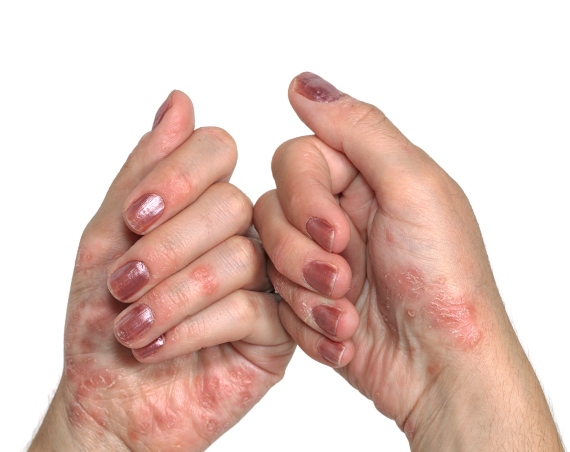Psoriasis is a more well known autoimmune disease affecting 8 million Americans and more than 125 million individuals across the world. Psoriasis is the result of skin cells reproducing too quickly as a result of the immune response. The body is not able to shed these cells as they produce, which is why the resulting symptom is areas of red, thickened and scaly patches of skin.

It has been found that psoriasis is a genetic autoimmune disorder but is worsened by illness, stress, alcohol and other potential factors. You may start to see lesions in the mouth if the overproducing cells make their way to the oral cavity. Oral lesions are typically rare, but in some cases if you’ve not been diagnosed with psoriasis yet and notice patchy lesions on the lips, this can be a first sign.
Otherwise, if you’ve already been diagnosed and notice lesions beginning in your mouth, speak with your dermatologist and dentist. If you have concerns we can evaluate and make sure you are connected with a specialist to help maintain your treatment.
There are 5 Different Types of Psoriasis:
- Plaque Psoriasis: This is the most common type most people think of when they hear the term psoriasis. It’s characterized by scaly patches of skin mentioned previously. These can often be itchy and may even crack and bleed.
-
Guttate: Presents with small round lesions. This form usually presents in childhood and may even be triggered by a strep infection, which are common among children.
-
Inverse: This form presents as shiny lesions usually in skin folds, behind knees in the under arms, etc. Inverse psoriasis is often found in combination with other types of the disease.
-
Pustular: Typically affecting the hands and feet, this form presents like you’d expect, with white pustules. Although it may look like an infection, it is not. The pustules are filled with white blood cells as a result of the immune response.
-
Erythrodermic: Although rare, this form of psoriasis is particularly severe. It presents as an extreme redness all over the body. It can cause the skin to peel and is usually itchy and painful. This form of psoriasis can be life threatening and you should see a doctor immediately if it appears. Erythrodermic psoriasis is often found in individuals with uncontrolled plaque psoriasis.
How exactly this particular disease affects oral health?
There is a lot of research that still needs to be done to determine how exactly this particular disease affects oral health other than its manifestation. In a study from Norway, it was found that 24% of participants with psoriasis had moderate to severe periodontitis. In contrast, only 10% of the control group without psoriasis suffered from moderate to severe periodontal disease.
At the end of the study, the assumption is made that the link between the two diseases is likely involved in the immune response. No definitive link has been found, so more research is needed to further understand what if any impact periodontal disease and psoriasis have on each other.
These different forms of psoriasis can all be very hard to deal with. It is our hope that further understanding will arise as research continues. We believe it is important for us and our patients to be educated in all the health risks or potential risks that can stem from oral health.
Psoriasis and Periodontal Disease
If a link is found between psoriasis and periodontal disease we will strive to provide treatment that can ease the symptoms of both diseases if possible. In the meantime, if you suffer from psoriasis or any autoimmune disease it seems that good oral health can often improve symptoms.
Some other at home self-care methods that may help with your symptoms are:
• Take daily baths. Bathing daily helps remove scales and calm inflamed skin. Add bath oil, colloidal oatmeal, Epsom salts or Dead Sea salts to the water and soak.
• Use moisturizer. After bathing, apply a heavy, ointment-based moisturizer while your skin is still moist.
• Expose your skin to small amounts of sunlight. A controlled amount of sunlight can improve psoriasis, but too much sun can trigger or worsen outbreaks and increase the risk of skin cancer. First ask your doctor about the best way to use natural sunlight to treat your skin.
• Avoid psoriasis triggers, if possible. Find out what triggers, if any, worsen your psoriasis and take steps to prevent or avoid them.
• Avoid drinking alcohol. Alcohol consumption may decrease the effectiveness of some psoriasis treatments. If you have psoriasis, avoid alcohol. If you do drink, keep it moderate.
At Laurel Dental Clinic it is our goal to treat patients with the best care possible, and that means looking at how we can improve other diseases you may suffer from. Good oral health is good for overall health! If you suffer from psoriasis and would like to discuss how we can further improve your oral health, we can talk it over at your next visit.
References:
Colgate: https://www.colgate.com/en-us/oral-health/conditions/immune-disorders/how-to-treat-your-psoriasis-mouth-symptoms-0715
National Psoriasis Foundation: https://www.psoriasis.org/advance/gum-disease-more-likely-in-people-with-psoriasis
NCBI: https://www.ncbi.nlm.nih.gov/pmc/articles/PMC4280688/
Mayo Clinic: https://www.mayoclinic.org/diseases-conditions/psoriasis/symptoms-causes/syc-20355840

